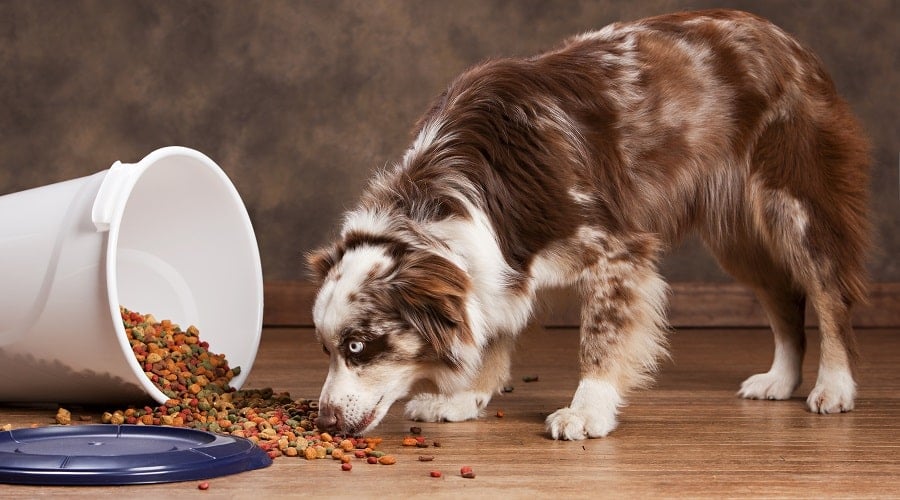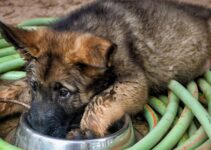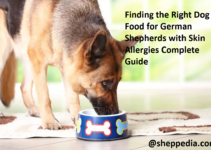Are you considering a new diet for your beloved Australian Shepherd? With so many options available, it can be overwhelming to decide which dog food is best.
In this guide, you’ll learn the key factors to consider when selecting dog food for an Australian Shepherd – from what to avoid, to tips for picking the perfect product. Together, we’ll find the ideal diet for your pup!
The Australian Shepherd is a hardy breed that requires a specialized diet consisting of high-quality proteins and fats to support their active lifestyle. Selecting the right food for this breed can be tricky since there are so many options available.
Here, we provide all of the important information you need to know about feeding your Aussie including what types of food to look for, the proper portions, and how often to feed them. With the help of this guide, you can ensure that your beloved companion is getting all of the nutrients they need every day.
Nutritional Needs of Australian Shepherds
When selecting the right diet for your Australian Shepherd, it is important to consider its individual nutritional needs. In general, they require high-quality food that contains a balance of proteins, fats, carbohydrates, vitamins and minerals in appropriate amounts.
Australian Shepherds need a balanced diet to maintain their health and vitality. A good quality kibble should contain the necessary nutrients in appropriate proportions. It should also contain an adequate amount of high-quality protein — precise quantities will depend on your dog’s age and activity level. Protein sources such as turkey, chicken, beef and fish are most beneficial for Aussies.
The essential fatty acid content of your dog’s food should also align with their specific energy requirements. Omega-3 fatty acids are especially important as they help promote healthy skin and coat condition as well as cognitive function. Sufficient dietary fiber helps digestion and maintains healthy blood sugar levels; some sources such as inulin can specifically support gut health.
Moreover, Australian Shepherds require a source of antioxidants to protect them from oxidative damage caused by free radicals generated during exercise or inflammatory conditions. Examples of beneficial antioxidants include beta carotene and vitamins E and C; vitamin B complex can also be helpful herding dogs given their active lifestyles which can cause them stress. Lastly a balanced calcium:phosphorus ratio helps support joint health while added taurine can help with eye development in puppies or adult dogs with deteriorating vision due to age-related degenerative problems like cataracts or glaucoma.

Protein requirements
Australian Shepherds, AKA Aussies, are medium-sized working dogs that require protein in their diet. As herding dogs, they are active and energetic; therefore, it is important to provide them with a healthy source of protein. Protein not only helps to build strong muscles but also aids in the production of hormones and enzymes used for proper growth and development.
Aussies need proteins that are rich in amino acids for energy, muscle strength, and healthy fur. The best sources of protein for Australian Shepherds include animal sources such as fish, poultry, beef, lamb and eggs as well as plant-based proteins including grains like quinoa and oats. Protein should make up 18-25 percent of your dog’s diet; however it may be higher if your Australian Shepherd is engaged in strenuous activities or competition.
Fat requirements
The Australian Shepherd is a high-energy breed that needs healthy fats to remain active and alert. Fats provide the dog with energy, help keep their skin and coat in prime condition, and aid in absorption of essential vitamins A, D, E and K. Look for dog food products that contain animal fat sources like chicken, duck or fish oil. Vegetable oils such as sunflower oil or canola oil are also beneficial. Fats should comprise at least 15 percent of the food’s calorie content.
Avoid any product containing unidentified fat sources (“animal fat” or “poultry fat” without a species listed) or artificial trans fats; these are not beneficial for your pet and could even be harmful over time.
Carbohydrate requirements
The Australian Shepherd is an active, energetic breed that needs a high-quality diet filled with balanced nutrition. Proper carbohydrate intake is important for providing a basis for energy and allowing the dog to perform their daily activities. It is preferable that protein and fat be the main sources of energy nutrient, but carbohydrates still support the energy needs of your Australian Shepherd.
Carbohydrate sources in dog food should come from healthy, natural ingredients such as grains, legumes, and vegetables. Grains provide essential nutrients such as vitamins B, E, potassium and zinc as well as dietary fiber which can help your Australian Shepherd’s digestion. Legumes are low in fat while still providing plenty of amino acids – the building blocks of proteins – to support muscle growth. Finally, different varieties of fresh vegetables contain essential vitamins such as A and K while adding important fiber to your pup’s diet. Together these natural ingredients can both fulfill the daily carbohydrate consumption requirements of your pup while supporting healthy growth and development in many ways.
III. Choosing the Right Dog Food
When selecting the right food for your Australian Shepherd, there are many factors to consider. First, you should understand your dog’s dietary needs and select a food that meets those needs. Australian Shepherds are relatively active dogs and burn a lot of calories, so it is important to choose a dog food that provides enough energy for activity and growth. A healthy diet should consist of protein from lean meats such as chicken, lamb, or fish; carbohydrates from grains such as corn or rice; fresh fruits and vegetables; and essential fatty acids such as omega-3 fats.
The size of your dog also plays an important role in choosing the right food since puppies will have different dietary requirements than adult dogs. Puppies need more energy, calcium, vitamins and minerals to help them grow strong bones and teeth. Adult Australian Shepherds need enough proteins for muscle development but fewer nutrients than a puppy does.
It is also important to consider any special nutritional needs that your dog may have due to age or health concerns. Senior pooches may benefit from higher levels of antioxidants in their diet to keep their immune system healthy as they age, while overweight dogs may require foods with lower levels of fat content to help them stay slim without sacrificing flavor. Some manufacturers offer specially formulated foods for sensitive stomachs that can ease digestive issues in certain breeds like the Australian Shepherd.
Reading dog food labels
Reading the dog food label is an essential part of choosing the best food for your Australian Shepherd. Dog food labels should provide lots of information about what the product contains, from ingredients to feeding directions. It is important to read and understand all this information when selecting the dog food, so that you can make an informed decision about which products are suitable for your pet.
Following are some tips that can help you choose a suitable product:
- Check the label to ensure that it lists full details on where and how ingredients were sourced, including country of origin, supplier or syndicated processor or manufacturer.
- Look at the Guaranteed Analysis section – this section tells you what percentage of crude protein, fat and fiber is in each product. Choose a formula with higher protein content and fewer carbohydrates for optimal nutrition for your Aussie Shepherd.
3 Life Stages Labeling – look for dog foods labelled specifically for growth (puppy), maintenance (adult) or all life stages – these formulas have been designed to meet specific nutritional needs of specific age groups.
4 Use By Date – check if there is a ‘Best Before’ date on the package – this helps guarantee freshness every time you buy a bag of dog food.
5 Premium Quality Dog Foods – select brands that only use high-quality ingredients, free from artificial colors or flavors – these products typically use superior natural sources of proteins such as venison or duck which can be more digestible than cheaper alternatives like beef meal or poultry by-product meal which may not be as easily digested by some dogs with sensitive stomachs.

Avoiding harmful ingredients
It’s important to be aware of several ingredients that can be harmful to Australian Shepherds and should be avoided when selecting dog food. These include any food colorings, preservatives, and by-products, such as beef by-products or poultry by-product meal. Many commercial brands rely heavily on these low quality ingredients and fillers for energy and flavor. These ingredients can cause digestive upset and other health problems in Aussies over time.
Additionally, many dog foods contain high amounts of empty calories or sugar for palatability, so look for a formulation that is as far from processed as possible. Finally, products with artificial flavorings or sweeteners should generally be avoided in order to minimize the chance of adverse reactions in your pup.
Considering your dog’s age and activity level
When selecting food for your Australian Shepherd, it is important to consider both his age and his activity level. Puppies need food that is formulated to meet their growth needs, while older dogs may have special dietary requirements due to health conditions. Inactive adults and seniors may require lower calorie formulas as well.
Young adults who participate in frequent activities and show events will require higher energy levels than those who lead a more sedentary lifestyle. If you have an active Australian Shepherd, look for formulas that are specifically designed to meet the needs of active dogs. These diets are typically higher in protein and fat with added vitamins, minerals, and other nutrients needed for optimal health in the athletic dog. Be sure to consult with your veterinarian about selecting a food that meets the needs of your pet’s lifestyle.
Homemade Dog Food
Australian Shepherds are medium-sized, active breeds that need well-balanced diets. Some pet owners opt to make their own dog food to meet the nutritional requirements of their pets. This can be done with ingredients easily found in most kitchen cupboards and refrigerators.
When making homemade dog food, it is best to consult with a veterinarian or canine nutritionist to learn which ingredients will provide your Australian Shepherd with the necessary vitamins, proteins and nutrients they need. It is also important that the diet is balanced and appropriate for the breed’s age and size.
Safety is also important when preparing homemade dog food for Australian Shepherds. Raw meat should be thoroughly cooked. Certain vegetables, legumes, fruits, dairy products and grains can be used but some items like garlic, onions and grapes should not be included in the diet as they can cause gastrointestinal upset or even organ damage if ingested in large amounts by your pet.
Be sure to store the prepared meals in airtight containers so they don’t spoil quickly. When feeding your pet a homemade diet, Switch between different recipes or dishes every few weeks so your Australian Shepherd gets an array of essential nutrients over time – this will ensure there aren’t any vitamin deficiencies resulting from an unbalanced diet for extended periods of time. Also providing treats whenever possible as rewards for good behavior helps ensure that adequate calories are being consumed as well as making meal times more enjoyable!
Benefits of homemade dog food
Homemade dog food allows you to control what your Australian Shepherd eats and how much of it they get. It also ensures that the food meets the nutritional needs of your Aussie. When making meals for your pup at home, make sure to include protein sources like meat, eggs, and dairy products. Whole grains and vegetables provide important vitamins, minerals, and fiber as well.
When preparing homemade dog food, it is also important to consider flavor preferences — your dog will appreciate it when you mix in some of their favorite flavors into their diet.
Cooking at home can be time consuming and tiring; but if you have the right recipes and a few extra ingredients on hand, homemade diets are a great way to feed your Australian Shepherd a balanced diet without breaking the bank.
Risks of homemade dog food
When it comes to selecting the right food for your dog, you also need to consider the risks of homemade dog food. While many owners believe that preparing meals at home is healthier for their Australian Shepherds, it can be difficult to provide the necessary amount and balance of nutrients. This type of diet typically lacks important minerals and vitamins, as well as trace elements like sulphur, choline and zinc which are essential for health in this breed.
In addition, raw meats used in all but cooked homemade diets can often be contaminated with salmonella or E coli bacteria which can cause illnesses in dogs (and humans). As well, certain species of fish contain high levels of methylmercury that are toxic if consumed in large enough quantities. If done incorrectly, a homemade diet can actually be dangerous for your Australian Shepherd’s long-term health.
For these reasons it’s important to research the components and health benefits associated with each ingredient before developing a homemade dog food recipe. You should also consult with a veterinarian before beginning any type of diet change as they can help you ensure that your dog is receiving adequate nutrition while minimizing potential risk.
Guidelines for preparing homemade dog food
Preparing homemade dog food The notion of preparing homemade pet food might be intimidating, but with the right ingredients and appropriate recipes it can be quite simple. If you decide to prepare your dog’s meals, here are some guidelines to help you get started:
– Choose high-quality proteins like lean meats, eggs, dairy products such as yogurt and cheese and fish.
– For a source of carbs, include cooked grains like brown rice and barley or starchy vegetables like sweet potatoes, squash and pumpkin.
– Include healthy fats in the form of canola or olive oil, as well as avocados; walnuts; flaxseed; almonds; and oily fish like salmon and tuna.
– Don’t forget about essential vitamins and minerals; these can come from fresh fruits such as bananas and apples (without the seeds), leafy greens such as broccoli or spinach ,or carbohydrates such as oatmeal.
– Avoid certain ingredients including onions (which can cause anemia in dogs), grapes or raisins (which are toxic to dogs), chocolate (which is also toxic), corn (which has been linked to allergies in some breeds) ,and any other high fat snacks which can contribute to obesity.
-Dogs will do better on smaller meals throughout the day rather than one large meal at once. Offering two small servings per day will insure Fido gets everything he needs while still allowing him room for treats later on!

Conclusion
Before you purchase a bag of food for your Australian Shepherd, it is important to research the ingredients list, find a trustworthy brand and make sure to provide your pup with the right amount of food. Your vet can provide valuable guidance on how to determine the right kind and quantity of food your dog needs. As a responsible Australian Shepherd owner, you should always closely monitor his health by regularly observing his behavior, appearance and overall well-being.
In conclusion, when selecting a dog food for your Australian Shepherd, make sure to consult with your vet first and carefully follow their instructions on what to feed your pup. Additionally, it pays to invest in quality dog foods sourced from trusted manufacturers as this will help ensure that your pup receives the essential nutrients he needs in order to remain healthy and active throughout his life.
FAQ
What is the best food to feed an Australian Shepherd?
High-quality dog food that is rich in protein and low in grains is best for Australian Shepherds.
How do I choose the right dog food for my dog?
Consider your dog’s age, size, activity level, and any health issues when choosing the right dog food.
Is Royal Canin good for Australian Shepherds?
Royal Canin has a specific formula for Australian Shepherds, but it’s important to check the ingredients and consult with a veterinarian before choosing any dog food.
Are Aussies picky eaters?
Some Australian Shepherds can be picky eaters, but it’s important to establish a consistent feeding routine and offer high-quality dog food.
Is Royal Canin better than pedigree?
Both brands have different formulas and ingredients, so it’s important to compare and choose the best option for your dog.
Do Australian Shepherds need a special diet?
Australian Shepherds don’t necessarily need a special diet, but they do require high-quality dog food that meets their nutritional needs.
What to avoid when choosing dog food?
Avoid dog food with artificial preservatives, fillers, and by-products. Also, be cautious of dog food with high levels of grains and carbohydrates.
What is the number 1 healthiest dog food?
There is no one healthiest dog food, but high-quality dog food brands like Orijen, Acana, and Blue Buffalo are often recommended by veterinarians.
What is the best daily food for dogs?
High-quality dog food that is rich in protein and low in grains is best for dogs.
Can Australian Shepherds eat rice?
Yes, Australian Shepherds can eat rice as part of a balanced diet, but it should be cooked and served in moderation.
See Also :
- Best toys for german shepherd puppies 2023
- Best toys for german shepherd 2023
- Best shock collars for german shepherds 2023
- Best brush for australian shepherd 2023
- Best dog beds for german shepherds 2023


